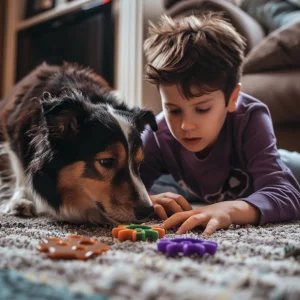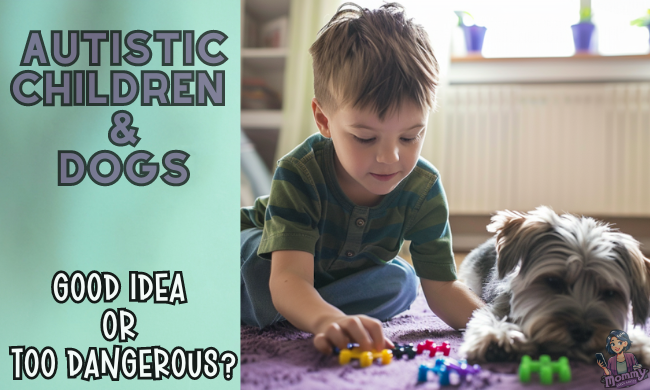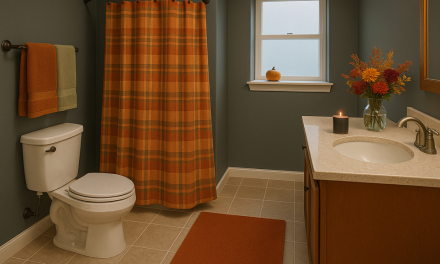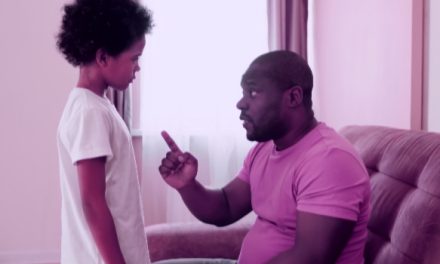Are dogs and autistic children a perfect match or a disastrous pairing?
Adding absolutely anything new to a household with autistic children is a terrifying idea. When I found out I was pregnant with my second child, there was a conflicting mixture of happiness and fear. Sure, I was excited about having a new addition to our family. But, there was also this fear. How would he handle such a massive change? Would he even understand who she was and why she was in our home? Whether the change is big or small, the idea of changing your autistic children’s home life is terrifying. So, believe me when I say I understand.
So, if you are considering getting a pet dog for your family… It only makes sense that you would wonder if getting a dog is a good idea when you have an autistic child. After all, you want a safe and comfortable environment for the dog and your child.
Grab a chair and keep reading mama, we’ll take a closer look at introducing your autistic household to a dog together.

Dog with a child
Autism Is A Spectrum Disorder
Autism is often described as a spectrum disorder and for a good reason. It’s a bit like a rainbow—every autistic child shines with their own unique colors. What works wonders for one child might be as useful as a screen door on a submarine for another. Don’t get me wrong, it is essential to gather all the advice, tips, and tricks you can get your hands on. Think of it as filling a toolbox with different gadgets. Some of these gadgets might become your go-to lifesavers and others will just collect dust.
At the end of the day, though, you are the ultimate expert on your child. You’ve been through the meltdowns, the breakthroughs, and everything in between. You know when a certain strategy is going to be a home run or a complete strikeout. So, while it’s great to have that toolbox you should always remember to trust your gut. You’re the captain of this ship. You know best what’s going to help your little one sail smoothly.
Reasons Dogs Are Good For Autistic Children
With this information in mind, dogs are generally a good match for kids on the spectrum. And, there are a lot of reasons why. Let’s take a closer look at some of those reasons.
1. An Emotional Support Amid Meltdowns
When the storm clouds of a meltdown start to gather, having a furry friend by your child’s side can be a game-changer. Dogs just have this magical ability to offer comfort and calm. Most of the time, the dog doesn’t have to do much other than be there.
Just picture it: your autistic child is in the throes of a big emotional wave. Then, their trusty canine companion comes trotting over with those big, understanding eyes. That simple presence can sometimes be enough to anchor your child back to calmer waters.
Dogs don’t judge or get flustered. They offer unconditional love and a soft place to land. Your child might find solace in petting their dog, feeling the steady rhythm of their heartbeat, or simply having them close by. It’s like having a built-in therapist who doesn’t charge by the hour! Plus, dogs can help create a soothing routine and provide a sense of stability.
So, while they might also occasionally steal a sandwich or bark at the mailman, the emotional support they offer during tough times is truly priceless.
2. Reduction Of Stress & Anxiety
Dogs aren’t just great during meltdowns; they’re also fantastic at reducing stress and anxiety. This is ideal because children on the spectrum frequently struggle with both of those things.
Picture this: your child is having a rough day and their stress levels are shooting through the roof. Enter their loyal dog, ready to save the day with a wagging tail and a heart full of love. Dogs have this incredible knack for sensing when something’s off and swooping in to provide comfort.
The simple act of petting a dog can lower stress hormones and release those feel-good endorphins. A dog is like nature’s version of a chill pill.
3. Built-In Structure & Routine
Furthermore, having a dog can help create a more structured and predictable environment, which many autistic children thrive on. The daily routines of feeding, walking, and playing with a dog can bring a sense of calm and order.

Dog with a child
4. Dogs Inspire Autistic Children To Exercise
Dogs can also be fantastic exercise buddies for autistic children. We all know how important it is for kids to stay active, but sometimes it can be a challenge to get them moving. That’s where a playful pup comes in.
Dogs have a way of turning exercise into a fun, engaging activity rather than a chore. Whether it’s playing fetch in the backyard, going for a walk around the neighborhood, or even just running around in the park, a dog can make getting exercise feel like an adventure.
Exercise isn’t just good for physical health. It can also help improve mood and reduce stress. For autistic children, the benefits are even greater. The physical activity involved in walking or playing with a dog can help regulate sensory input, burn off excess energy, and provide a much-needed outlet for any built-up tension.
Furthermore, the bond formed through these activities can strengthen their relationship with their dog, creating a sense of companionship. Exercising with their dog can also turn into a routine that autistic children may find extremely comforting.
So, Are Dogs & Autistic Children A Good Match?
Sure, dogs come with their own set of problems. The benefits, however, outweigh the odds if you are thinking about getting a pet for your autistic child. Just remember what I said earlier about autism being a spectrum disorder. My son, for example, has zero interest in dogs. He kind of just looks through them. They don’t hinder his environment, but they don’t add anything to it either.
In general, it is a good idea to find a friend or family member with a dog and try introducing your child to a dog first. There is a chance your child could end up being scared of the dog. I’ve known a few families that had to pass on a dog because their child was afraid of the dog and having one just added to the child’s anxiety.
At the end of the day, the best thing you can do is trust your gut. I do, however, highly recommend testing the waters before committing to a dog.





















